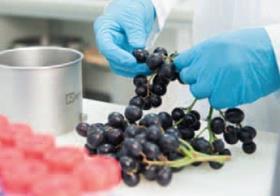
Consumer fears over the potential health risk posed by alleged pesticide residues on fruit and vegetables sold in the country have been heightened once again following the publication of a new report by Greenpeace, which suggests crop sprays remain a major cause for concern when it comes to fresh produce.
As part of a new publication entitled Essen ohne Pestizide (Food without pesticides), the organisation conducted tests on more than 22,000 samples and found that 80 per cent of all conventionally grown fruit, as well as 55 per cent of vegetables, carried traces of pesticide.
The report uses a green-yellow-red traffic light system to provide consumers with guidance on which products to avoid, marking out 76 fruit and vegetables as containing pesticides and recommending the public avoid almost one-third of the items tested.
Particularly dangerous and problematic, said Greenpeace, were products from outside the European Union, including table grapes, peppers, pears, courgettes and grapefruit from Turkey, which was described by the group as the worst offender when it came to breaches of EU maximum residue levels.
One sample of Turkish table grapes reportedly contained traces of 24 pesticides, Greenpeace noted.
Exotic vegetables such as okra and chilli peppers from India and Thailand also presented a risk of contamination while, closer to home, concerns were also raised about high toxin levels in lettuce supplied to the German market by suppliers in Belgium, Italy and the Netherlands.
'Anyone who wants to avoid pesticides in food should choose organic products, or pay attention to the country of origin of fruit and vegetables,' said Manfred Santen, Greenpeace's resident pesticide and food safety specialist.
'A wide range of pesticides can be sprayed legally in fruit and vegetable production,' Santen added. 'Greenpeace calls on agriculture minister Ilse Aigner to protect consumers and the environment better from pesticide cocktails.'
Poisonous material
 Meanwhile, German consumer affairs magazine öko-Test is also preparing to publish the results of a major investigation into pesticide residue levels in fresh fruit and vegetables sold in the country.
Meanwhile, German consumer affairs magazine öko-Test is also preparing to publish the results of a major investigation into pesticide residue levels in fresh fruit and vegetables sold in the country.
Under the headline 'Unser täglich gift' ('Our daily poison'), which appears on the cover of its forthcoming May 2012 issue above an image of fresh produce and a skull, the magazine will report on recent tests carried out by the Frankfurt-based publisher.
A spokesperson for the magazine told Eurofruit the results of the tests would be made public closer to the issue's publication date.
'The articles are currently being prepared and so we cannot reveal any of the findings at this time,' she said.
öko-Test has published a number of investigations into the quality of fresh fruit, vegetables and juices over the past few years.
–
Click to download a copy of the Greenpeace Essen ohne Pestizide report
Where Greenpeace concluded that more than 33 per cent of the tested samples of a certain product were 'not recommended' for human consumption, those products were marked with a red traffic light as a precaution in Greenpeace's Essen ohne Pestizide report.
Those products were as follows:
- Pineapples from Ghana
- Apples from Austria
- Apricots from Greece
- Bananas from Costa Rica, Ecuador, Colombia and Panama
- Pears from Chile, Italy, South Africaand Turkey
- Clementines from Italy and Spain
- Grapefruit from Israel, Spain; South Africa and Turkey
- Lemons from Brazil
- Mandarins from Spain
- Mangoes from Thailand
- Nectarines from Chile
- Oranges from Argentina, Greece, Spain and South Africa
- Papayas from Brazil
- Pitahayafrom Vietnam
- Table grapes from Chile, Germany and India
- Basil from Thailand
- Chilli peppers from Thailand
- Green beans from the Dominican Republic and Thailand
- Potatoes from France
- Lettuce from Belgium, Italy and the Netherlands
- Carrots from Spain
- Okra from India
- Peppers from Turkey
- Tomatoes from Morocco
- Courgettes from Turkey
- Sugarsnap peas from Kenya



